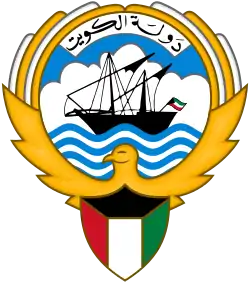Kuwait–Philippines relations
Kuwait–Philippines relations refers to the bilateral ties of Kuwait and the Philippines.
 | |
Kuwait |
Philippines |
|---|---|
History
Kuwait was recognized by the Philippines in September 1961, three months after it gained independence. Formal diplomatic relations would later be established between the two countries on January 17, 1979. The Philippines established an embassy in Kuwait in 1979.[1]
The Philippines was part of the United States led coalition to liberate Kuwait from Iraqi control during the Gulf War in 1991.[2] Kuwait then open an embassy in Manila on May 24, 1996.[1]
Economic relations
Trade
Trade between Kuwait and the Philippines amounted to $779 million in 2015 with the balance of trade favoring Kuwait. Kuwaiti investments in the Philippines are primarily agricultural in nature.[2] In 1981, a bid by Philippine firms to build a $300 million highway to connect Kuwait to Baghdad, Iraq was highly publicized.[3]
Labor
Around 250 thousand Filipinos, 65 percent of which are domestic helpers, works in Kuwait according to the Philippine embassy in 2018.[4] Domestic workers from the Philippines along with migrants from Sri Lanka and India began to settle in Kuwait in the 1970s. Reports of humans rights abuses against migrant workers in Kuwait including Filipinos remains a concern of the Philippines.[5]
Alleged cases of abuse and rape has led to Filipinos making a petition to their government to ban the deployment of domestic help to Kuwait in 2013. The petition has collected at least 10 thousand signatures.[6]
Controversies
2018 diplomatic crisis
President Rodrigo Duterte issued a ban on deployment of Filipino workers to Kuwait in February 2018 following a series of deaths of Filipino domestic workers. The incident that led to the ban reportedly was when the corpse of a Filipino domestic worker was discovered in a freezer inside a warehouse that had been abandoned since November 2016.
In April 2018, a video showed purported action by Philippine embassy officials rescuing Filipino maids from allegedly abusive employers. Kuwait protested that the action challenged their sovereignty. In May 2018, an agreement was signed pledging greater rights for Filipino migrant workers; the deployment ban was eventually lifted.
2019 OFW death
On December 31, 2019, an OFW named Jeanelyn Villavende was reportedly killed by the employer's wife, according to the Department of Foreign Affairs (DFA). The DFA condemned the death of the woman, "calling it a violation of the agreement signed by the Philippine and Kuwaiti governments in 2018 for their protection."[7] An autopsy was conducted by the National Bureau of Investigation (NBI) revealed that the woman was sexually abused prior to her death.[8]
References
- Santiago, Michelle Fe (31 May 2016). "Philippine embassy hosts diplomatic reception". Arab Times. Retrieved 14 February 2018.
- "Kuwait seeks to establish chamber of commerce and industry in PHL". GMA News. 26 May 2017. Retrieved 14 February 2018.
- "The Philippines Middle East Diplomacy and Marcos's Saudi Visit" (PDF). Central Intelligence Agency. March 1982. Retrieved 14 February 2018.
- "Kuwait calms Philippines after dead worker found in freezer". Sun Star Manila. 14 February 2018. Retrieved 14 February 2018.
- "Walls at Every Turn". Human Rights Watch. 6 October 2010. Retrieved 14 February 2018.
- Trenwith, Courtney (4 September 2013). "Filipinos call for ban on helpers in Kuwait amid abuse". Arabian Business. Retrieved 14 February 2018.
- "Filipina allegedly killed by employer's wife in Kuwait". ABS-CBN News. Retrieved January 13, 2020.
- "OFW Villavende sexually abused, battered before death – NBI autopsy". Rappler. Retrieved January 13, 2020.

